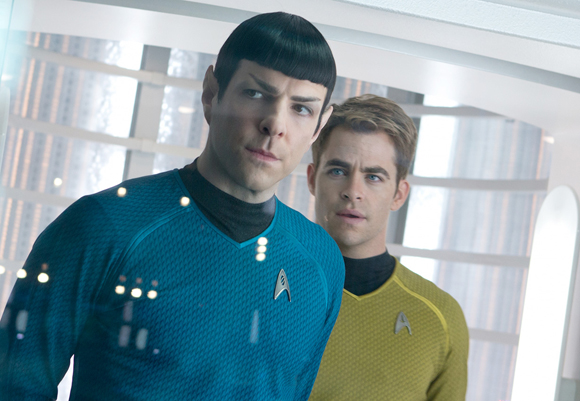 The New Yorker featured an interesting essay today titled “Is ‘Star Trek Into Darkness’ a Drone Allegory?” The essay dovetails with some of my criticism of the film shared in a previous post. In particular, this essay by Amy Davidson notes that in addressing counter-terrorism issues the setup in the movie has promise, but in the end it collapses on itself. After discussing various issues in the movie that it seemingly raises in order to present some kind of critical commentary, Davidson writes: “It is telling and useful that all of these themes are showing up in movies; they don’t come up enough in public debate. But they are thoroughly jumbled here.” The author then connects the dots between this installment in the Star Trek franchise and the Obama Administration and our national struggle with the “War on Terror”:
The New Yorker featured an interesting essay today titled “Is ‘Star Trek Into Darkness’ a Drone Allegory?” The essay dovetails with some of my criticism of the film shared in a previous post. In particular, this essay by Amy Davidson notes that in addressing counter-terrorism issues the setup in the movie has promise, but in the end it collapses on itself. After discussing various issues in the movie that it seemingly raises in order to present some kind of critical commentary, Davidson writes: “It is telling and useful that all of these themes are showing up in movies; they don’t come up enough in public debate. But they are thoroughly jumbled here.” The author then connects the dots between this installment in the Star Trek franchise and the Obama Administration and our national struggle with the “War on Terror”:
The dialogue contains several reminders that, confronted by danger, we must not forget “who we are”—one comes in a speech that Kirk gives at the very end. One fears that what he means is not that he should remember that he is an officer in a society governed by laws—and for good reason—but that he is James Tiberius Kirk. The only real conclusion in the movie is that Kirk should trust his instincts, and carry on meaning well and standing up for his friends. President Obama is due to give a big speech on Thursday about counterterrorism, drones, detainees, and everything he’s trying to do in that space. For a President who has been accused of being Spock-like, his approach to national security and the law has been far too Kirk-like: driven by a belief that his good will alone, his character, compensates for legal limbos like Guantánamo and discredits the anger, here and abroad, about drones. He remembers who he is, and thinks that that should be enough. He’s wrong; what we need to remember is what America is, and ought to be.





There are no responses yet